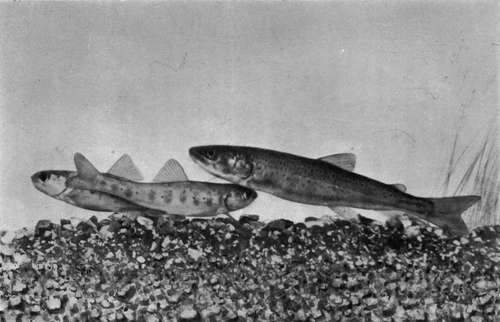England And Wales. Part 9
Description
This section is from the book "Salmon Fishing", by W. Earl Hodgson. Also available from Amazon: Salmon Fishing.
England And Wales. Part 9
"From these and other records it is clear that there was a very rapid decline in the salmon fishings of the Thames during the last few years of the eighteenth century and the first quarter of the nineteenth, ending in the complete disappearance of the fish somewhere about 1830. The causes of extinction must, therefore, be sought for in that period. There is no evidence of serious pollution of the river at that time, and there is little doubt that the salmon were first driven away by the gradual canalisation of the river following the Thames Navigation Acts of 1788, 1789, and 1812. These enactments led to the continual erection of weirs and pound locks, which, unprovided with passes, eventually barred the upper reaches to the fish. Mr. Spencer Walpole, an Inspector of Salmon Fisheries in 1869, was clearly of this opinion. In his report for that year he wrote: 'The chief cause which has destroyed our rivers in a salmon sense is the existence of weirs . . . the invention of the pound lock seems to me to explain very clearly the exclusion of salmon from many rivers, including the Thames, which has taken place during the last century.' The pound lock had been substituted for the old open shoot, up which barges were wound with winches; the shoot had presented no obstacle to the fish. Immediately following the complete canalisation of the river, in itself sufficient to account for the disappearance of the salmon, came pollution during the middle years of the nineteenth century, which effectually completed the work of destruction begun by the locks and weirs.
"The efforts of the London County Council and the Thames Conservancy have resulted in a great improvement in the state of the river. Those of the Thames Salmon Association have been directed towards showing that this improvement as regards the lower waters has proceeded far enough to allow of the passage up and down of migratory fish. The canalisation difficulty is avoided by rearing the young fish near the lower reaches and releasing them at the head of the tideway. The experiments have now been conducted continuously for six years, during which many thousands of two-year-old smolts, reared at Denham by Mr. W. Crosbie Gilbey, who has generously placed his hatchery and his valuable services at the disposal of the Committee, have been turned in. No fish has been found dead, and it has been proved season after season that the smolts live and thrive in the Thames before going down to the sea. Early in the summer of 1905 there were very encouraging reports from the mouth of the river, where grilse were assembling, presumably with intent to run up the estuary. A few fish were taken in nets. As these were all of similar weight, there is a strong presumption that they were fish which had, as smolts, been released at Teddington, and that a favourable combination of flood water in the river and high tide might have enticed them up.
"The Committee think it desirable that the experiments should be continued some years longer, especially as many details of the natural history of the salmon are still obscure, and there is great difference of opinion among experts as to the period the young fish spend in the salt water before returning as grilse.
" Meanwhile the Committee have taken a step that will be of general interest. Mr. Gilbey has successfully hatched ova of the huchen, the non-migratory salmon of the Danube, and has turned several hundred of the young into the river. The huchen grows to a great size, and shows high sporting qualities."
Lord Desborough, Chairman of the Thames Salmon Association, thinks that the adversity from which the river began to suffer many years ago was other than that stated by Mr. Boulton. He writes:-
"The return to Teddington of the smelt, an estuarine fish, was the great encouragement we had for the salmon restoration experiment. Smelts were caught in large numbers at Richmond and Teddington just before we began. In a spate, salmon could have passed up the Thames' weirs easily enough. I agree with Archdeacon Venables that it was chemical refuse, chiefly from gas works, that killed the fish in the estuary. The estuary is now much improved in that respect. Fresh-water fish go much farther down, and sea fish higher up, than was the case some years ago. I went into the matter somewhat fully before we began; also into the question of the aeration of the water, of which, in connection with the sewage outfalls, Dr. Clowes of the London County Council keeps useful charts."
Whether it is Mr. Boulton or Lord Desborough who is right as to what happened long ago, all's well that promises to end so well as the restocking of the purified Thames.

Young Salmon In The Thames - W. B. Boulton.
The small fish, natives in British waters, are four times the age of the less small, an alien from the Danube.
Continue to:
Tags
salmon, fish, river, fishing, trout, loch, flies, fishing flies
